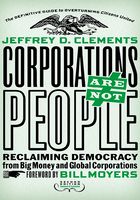
The Citizens United Decision
In Citizens United, the Court struck down the federal Bipartisan Campaign Reform Act (also known as McCain-Feingold, after its Republican and Democratic sponsors). The Bipartisan Campaign Reform Act had banned electioneering spending by corporations and unions for or against specific candidates within sixty days of a federal election. The law was intended to prevent corporations and unions from bypassing election integrity and anticorruption laws dating back more than a century.
The case is called Citizens United because a Virginia nonprofit corporation by that name sued the Federal Election Commission to challenge the corporate spending restriction in the Bipartisan Campaign Reform Act. Citizens United, the corporation, wished to use its corporate money and donations from for-profit corporations to make and distribute what the Court described as a feature-length advertisement against Hillary Clinton, who was running for president when the case began. Further, Citizens United sought to do this within the sixty-day period before an election when the law restricted corporate spending on electioneering activity. According to Citizens United, the law violated corporations’ First Amendment rights of free speech because it prevented Citizens United, the nonprofit corporation, from engaging in electioneering activity and did not allow for-profit corporations to contribute to that campaign to influence the election.
Of course, people are free to make a feature-length advertisement attacking a powerful senator running for president if that is what people wish to do, and people may pool their money to do this. That is essential for political participation. At first blush, the background to the case seemed to warrant concern about government restrictions on the free ability of people to pool resources to advocate views.
The Court majority in Citizens United, however, was not content to leave the case at first blush. Instead, they saw an opportunity to throw out a century of law they thought too restrictive of corporations. In the end, the Citizens United decision decreed that all corporations (and all unions) have a constitutional right to spend unlimited money in any American election—federal, state, local, and judicial.
The Supreme Court had rejected this argument only a few years earlier, when Justices William Rehnquist and Sandra Day O’Connor were still on the Court. In 2003, in the case of McConnell v. Federal Election Commission, the Court ruled that the very same corporate spending provision in the McCain-Feingold law did not violate the First Amendment. In McConnell, the Court agreed that Congress may make different election spending rules for corporations than for people. The Court in McConnell followed the 1990 case of Michigan Chamber of Commerce v. Austin, in which another majority of the Court had ruled that corporate money, aggregated with advantages that come from the government, is not the same as people’s money pooled together. Corporate spending in elections can be restricted because government creates the advantages for corporations to make them effective in the economic sphere, and the same advantages pose dangers in the political sphere.
Now in Citizens United, the Court, with the additions of a new chief justice, John Roberts, and a new justice, Samuel Alito, threw out McConnell and Austin. The Citizens United Court said its earlier decisions were wrong. The Court struck down the McCain-Feingold law as a violation of free speech rights and invited billions of corporate dollars into American elections.
Justice Anthony Kennedy wrote the opinion in Citizens United for the Court. At first, Justice Kennedy’s opinion sounds like a ringing defense of free speech and American democracy. He writes that the government may not “ban speech.” Yes! All “speakers” must be allowed and no “voices” may be silenced. Yes! The government cannot restrict a “disadvantaged person or class” from speech. Yes! All “citizens, or associations of citizens,” must have a right to get their views about candidates or anything else out to the people. Of course!
But wait. Who are these “voices,” “speakers,” and “disadvantaged persons”? They are corporations, particularly global corporations with trillions of dollars in revenue and profits. And what was this onerous “ban on speech”? A rather weak law that said a corporation may not, within sixty days of an election, spend its “general treasury” money to support or attack candidates for federal office. That’s it.
The Court announced its decision on a cold January day in 2010 when most Americans were anxious about millions of job losses, angered by national debt and massive deficits deepened by corporate bailouts, and worried about our military and global strength overstretched by distant wars while China, Germany, and other economic powerhouses at peace charged ahead. Now the Supreme Court says corporations are “disadvantaged persons” with “rights” that trump and invalidate our laws?